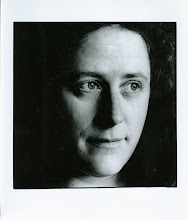Last Saturday evening I went to a production (one woman play) called "Crazy" by Gail Marlene Schwartz up at the Vermont College Chapel. Third Story Window is the name of Gail's community based art/performance company. Very Cool. VSA Arts of Vermont was the producer for the 5 performances in Vermont, the one in Montpelier being the last of them.
I'm so glad I went! Gail's story, which is autobiographical, centers on her experience of the 18 therapists she's seen since she was 5 1/2 years old. It's a great story and afterwards there was a panel discussion with local providers, consumers, advocates and some combination of all three and the audience, and Gail, the actor/writer. It was a great experience, and instead of re-writing all about it I'm going to re-print the evaluation/testimonial here.
Initially I scribbled some notes to myself and wasn't sure if I was going to send Gail or the producers my feedback, but after a couple of encouraging e-mails from Gail I decided to go ahead.
Although I've never been diagnosed as "clinically" one thing or another I've never felt "normal" either. Not coincidentally this was also my mother's approach to being pinned down mental-health wise, in large part because once one is diagnosed it is on one's permanent health record...or something like that.
So seeing someone explore their life-long relationship with the therapeutic process with humor and panashe and so fearlessly, despite interruptions indicating the contrary (see answer #2 below), well, it was just great! At some point I will post a response to the questions of Jewish and Crazy that Gail posted about recently. In the meantime, I think this is plenty to read about right here.
1. If you were telling a friend what you appreciated about this presentation (show), what would you say?
I liked the story, the method of story telling (not linear!) and detail choices, the set, props and three dimensionality of the stage (riding bike onto stage, using props handed up and thrown back from front row, etc) and the intelligence and wit.
2.What moment/s stood out for you and why?
The "interruptions" of neurotic cleaning during particularly tense or tender moments of the performance, the video of the actor's younger self riding her bicycle near the end of the performance, and the stills of the actor's recent self crying. The cleaning interruptions were so funny and real. The actor used the bike with the banana seat through the whole performance, and spoke beautifully about her experience of learning to ride her bike. As an audience member, when I got to see real footage of her riding her bike, I found it quite moving and saw it as a statement about the actor's resiliency and innate sturdiness in the face of 18 versions of interpreting her "craziness". I was very surprised by the stills of the actor crying, as this is, usually, as emotionally vulnerable as a person can get. I appreciated the actor's inclusion of these stills, but didn't fully appreciate their value until I read the materials afterward and discovered the actor had been photographing herself in high states of emotion to include in future performance pieces.
3. What did not work/what would you change about the presentation and why?
The "Rorschach" test images were invisible from where I was sitting. I felt I was being shown a blank (or almost blank) screen and being asked to interpret nothing; that it was a joke, which was frustrating. At the end of the performance I saw that the images were shown in their original size and shape and were actually out of focus close ups of objects, and the actor's face. I wish the test images were just a little less out of focus, maybe because Rorschach test images are so graphically stark.
4. Were your views about mental health/illness impacted by the presentation? How?
Yes. I felt a surge of positive associations with being on the "crazy" end of the mental health continuum. That is, I identified with the intelligence, wit and vulnerability portrayed by the actor. I'm not crazy about being considered "crazy", but this performance displaced a chunk of the shame associated with it, and I also felt less isolated. Thanks.
5. Would you recommend this program for other communities? Why or why not?
Yes! What's not to like??? Seriously, because it takes issues that might be seen as "mental health" issues and turns them into human issues, which is something everyone can benefit from.
6. Any other comments?
Thanks to the actor for baring her soul, and VSA Vermont for producing the performance, and the Vermont Community Foundation for funding the project! This is important work and should certainly be supported in the future.
7. May we use your comments in future projects?
Yes.
Saturday, March 29, 2008
Subscribe to:
Post Comments (Atom)







No comments:
Post a Comment